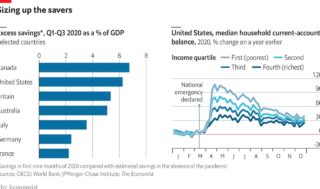Why two tech giants have different answers to the question of who should pay for news
SOME READERS will have come to this article through The Economist’s app; others will have heard about it in a newsletter or podcast. The largest number, however, are likely to have arrived here via a link on Facebook. Except, that is, in Australia, where on February 18th the world’s largest social network blocked the sharing of all news articles, Australian or otherwise, as well as banning the sharing worldwide of any articles that originated in Australia.
The news blackout was Facebook’s last resort in a long-running battle over who should pay for news online. Rather than pay media companies in return for linking to their stories, as a forthcoming Australian law would require, the company opted to block all such links on its platform. The decision came hours after Google, the other big tech firm targeted by the new law, made the opposite decision, signing a deal with Rupert Murdoch’s News Corp to carry on linking to stories from that publisher.
The dust-up, which is far from over, pits the new media barons of Silicon Valley against the old ones of television and the press. What so far looks like a one-all draw in Australia is likely to be played out around the world in the months ahead.
Australia’s “news media bargaining code” has been in development for three years, but the argument is older. A decade ago offline media controlled more than 80% of the advertising market in Australia. Yet there, as in the rest of the world, advertisers have found that digital media are better at reaching their audiences. In the past ten years offline media’s share of the market has fallen by half. The lion’s share has gone to Facebook, which dominates display ads, and Google, which has cornered the search market.
Media companies claim that, by showing ads alongside links to their articles—sometimes including short summaries and photos—the tech platforms are in effect monetising content that is not theirs. The platforms retort that, on the contrary, the media firms do better out of the exchange. Facebook says that in Australia last year it sent 5.1bn clicks to Australian publishers, which it claims were worth A$407m ($317m). If publishers feel they are getting a bad deal, it asks, why don’t they simply stop publishing on Facebook?
Under the Australian government’s proposed solution, currently before the Senate, tech platforms would be expected to negotiate payments to publishers. In the event that the two parties could not agree, an official arbiter would decide whose suggested payment was fairer (splitting the difference would not be an option). The new rules would also require tech firms to advise publishers in advance of any changes to their ranking algorithm that would affect them.
Both tech giants are aghast. Paying publishers for news is not without precedent: last month Google agreed to compensate French ones for linking to their stories. Both companies have recently launched “curated” news products—Google News Showcase and Facebook News—in which payments are made to the creators of content (including, in the case of Facebook News, The Economist). But Australia’s winner-takes-all arbitration regime is a more alarming prospect than the system in France, where disputes are expected to be settled by the courts. The French deal, the details of which are private, probably involves payments for displaying snippets of news, not just links. And the requirement to publicise changes to their secret and ever-changing algorithms unsettles them further.
Whereas Facebook walked away, Google blinked. Its three-year deal with News Corp will see it hand over an unspecified amount of money to include content from the publisher’s titles, including in America the Wall Street Journal and the New York Post, and in Britain the Times and the Sun, in its News Showcase. Earlier in the week it had announced similar deals with smaller outfits, including Seven West Media and Nine Entertainment. Blocking links to news would have rendered its search engine much less useful, sending customers to rivals such as Bing, run by Microsoft (which has cheered on Australia’s plans). For Facebook, news matters less, representing less than 4% of what users see in their feed. And though Australia is one of Facebook’s biggest foreign markets, it represents only a sliver of its global revenues. So walking away was better than setting a precedent by coughing up, it calculated.
Public reaction in Australia is testing that assumption. Facebook botched the blackout, accidentally banning not just news sites but links to health departments, fire services, a women’s shelter and a project for children with cancer, among others. Although most of these mistakes were quickly corrected, it was a disconcerting demonstration of the power wielded by the company. Australian media—concentrated in the hands of News Corp—has no doubt who is to blame. “No likes as unsocial network blocks millions”, read a headline in the Murdoch-owned the Australian.
Scott Morrison, the prime minister, wrote in a post on Facebook that the company’s actions to “unfriend Australia” would “only confirm the concerns that an increasing number of countries are expressing about the behaviour of BigTech companies who think they are bigger than governments and that the rules should not apply to them”. He may be right. David Chavern, head of the US News Media Alliance, an industry body, tweeted that “we are expecting a big push in the US in the new Congress.” Julian Knight, the chairman of Britain’s House of Commons committee on media, accused Facebook of “bullying”. “These platforms make enormous sums of money from other people’s work, and they aren’t returning any equitable value to them,” he told the BBC.
The European Union, which is debating a bumper package of new tech regulations, is pondering something similar. Earlier this month Robert Thomson, News Corp’s chief executive, declared that “there is not a single serious digital regulator anywhere in the world who is not examining the opacity of algorithms, the integrity of personal data, the social value of professional journalism and the dysfunctional digital ad market.”
If those regulators copy the Australian model, more stand-offs between the new and old media barons are in store. And whoever wins those confrontations, it looks as if the main losers may be small news organisations. Too small to fall within the scope of Australia’s new code, they stand to see their bigger rivals become mightier still if tech firms agree to cough up. Meanwhile, if the tech firms decide to walk away, the tiddlers stand to lose by far their most important means of distribution. The Australian code has succeeded in shaking some money out of Silicon Valley. It is not clear that it will do a lot to help journalism.
By The Economist





